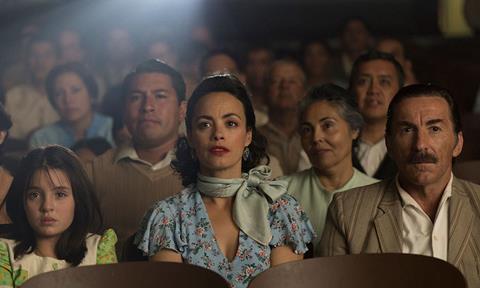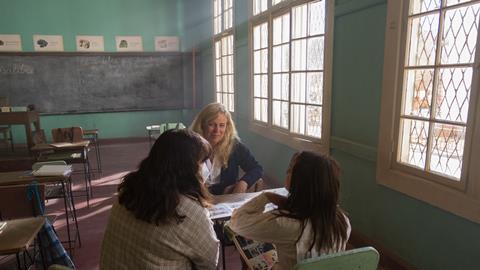Ever since she broke onto the international stage in 2000 with Italian For Beginners, Danish filmmaker Lone Scherfig seems to have spent more time abroad than at home, especially the UK where five of her films — including the Oscar-nominated An Education — are based.
Her latest, The Movie Teller, is no different. “Going abroad is about filming as sharing,” says Scherfig. “I’d rather share my fascination for [a different world] than portray my own world. Looking back at my work, I can see that the films are all related, in terms of tonality, characterisation, a combination of melancholy and wit, and [common themes such as] loss of innocence, insecurity.
“When I read a script, I always [know] if I can do justice to the writer and the script or the novel, and if I can add something,” she continues. “I can express love for the characters because the films are not about me. Or maybe I can be more interested in them because the films are not a projection of myself. It’s more about filming as an act of generosity. Also, Denmark is not a very dramatic society.”
Still, the world of The Movie Teller represented a voyage into the unknown for the filmmaker. A co-production between Spain’s A Contracorriente Films, France’s Selenium Films, Chile’s Altiro Films and Spain’s Contadora Films AIE, with Embankment Films handling sales alongside Latido Films (co-repping Latin America), the film is based on the bestselling novel by Chile’s Hernan Rivera Letelier.
Set in the 1960s in a mining town in Chile’s Atacama desert, The Movie Teller focuses on one family’s survival when the father loses his job after a mining accident. The mother then leaves suddenly and mysteriously, and their only daughter – Maria Margarita, who has inherited her mother’s creative talent and love of cinema – is soon making a living by acting out the latest film releases to those who cannot afford a ticket.
But their peaceful lives are thrown into turmoil by an individual act of violence and then the brutality of Augusto Pinochet – who seized power in a military coup 50 years ago – and his dictatorship.
Finest moment
The project was first developed by Brazilian director Walter Salles and later by Spain’s Isabel Coixet (who each left due to scheduling conflicts). When Spanish producers A Contracorriente Films boarded, they approached Scherfig, having previously distributed her films in Spain. Rafa Russo joined to work on the script.
“I think they approached me because [the producers] had seen Their Finest and saw something in it that would fit,” says Scherfig. “It was the combination of film and reality that I’d already had to deal with in that film.”
It was not just the cinematic theme that intrigued Scherfig. “It starts out as a story about a dysfunctional family and ends as a story about a dysfunctional nation,” she observes. “Life for the children in those townships was kind of idyllic because it was a safe and secure world – until you lost your job. Watching how Maria Margarita’s story gets more emotional and more profound is part of what attracted me. It’s not as sweet a film as it is at the beginning.”
The Movie Teller’s main location was a real abandoned mining village in the Atacama desert, home of the original movie teller that Rivera Letelier based his story on. The crew restored the village and left it intact to be used by the locals when they return on occasional visits to the place of their birth with their families.
“So many people in Chile lived in and grew up in this mining world,” says Scherfig. “There is a mine not far from the one we used which was a concentration camp during the Pinochet years and it still has barbed wire and landmines. It’s all so recent. Every family has a connection to the Pinochet horror.”
Unexpected challenges

Shooting in the desert plains threw up several challenges, and not just the usual issues of dust and sun exposure. “I wasn’t expecting so many earthquakes,” says Scherfig. “They aren’t very dangerous in the desert because the ground is very hard. The crew would take bets on how high on the Richter scale they were, but to me it was shocking.
“The location was a challenge logistically – there was no water or electricity, and it was very hot by day and freezing by night. The sun was harsh. Coming from a country with long dusks and soft Scandinavian light, it was a big change. But I missed that landscape so much when I left.”
The Movie Teller stars Bérénice Bejo and Antonio de la Torre as Maria Margarita’s parents and Daniel Brühl as the local mine manager, alongside Chilean newcomers Alondra Valenzuela and Sara Becker as the child and adult versions of Maria Margarita. Scherfig enjoyed directing the mix of experienced and new talent.
“Antonio is a real method actor – he stayed in his wheelchair all the time once his character is invalided,” says Scherfig. “He was a real inspiration to the children and newcomers, the way he focused so completely. That was a huge help for me.
“I would direct all the actors differently,” she continues. “You can communicate with Bérénice in a very technical way and she comes back with something very emotional. And I was very happy when I heard Daniel wanted the part of the mine manager. The mining bosses could choose any of the women to take as a lover, but Daniel made the character very complex and sympathetic.”
The Movie Teller world premieres at Toronto International Film Festival and the director is thrilled to be back in Toronto for the fifth time.
“I’m very grateful because Toronto helped to launch my films. It’s a great audience – couples go there on holiday just to watch films – and there’s no competition, so there’s something very peaceful and joyful about that,” says Scherfig, who is now on the second season of Danish medical TV series The Shift (Dag & Nat) starring Sofie Grabol and is also developing a film project.
“It’s another non-Danish story and it’s a period film,” she reveals. “I long to return to England; I like the work ethic there and the locations.”















![[L-R]: Amanda Villavieja, Laia Casanovas, Yasmina Praderas](https://d1nslcd7m2225b.cloudfront.net/Pictures/274x183/6/4/1/1471641_pxl_20251224_103354743_618426_crop.jpg)




![Kindred Spirits [4] Horizontal Image[9]](https://d1nslcd7m2225b.cloudfront.net/Pictures/100x67/6/9/4/1473694_kindredspirits4horizontalimage9_45584.jpg)




![[L-R]: Amanda Villavieja, Laia Casanovas, Yasmina Praderas](https://d1nslcd7m2225b.cloudfront.net/Pictures/100x67/6/4/1/1471641_pxl_20251224_103354743_618426_crop.jpg)
No comments yet